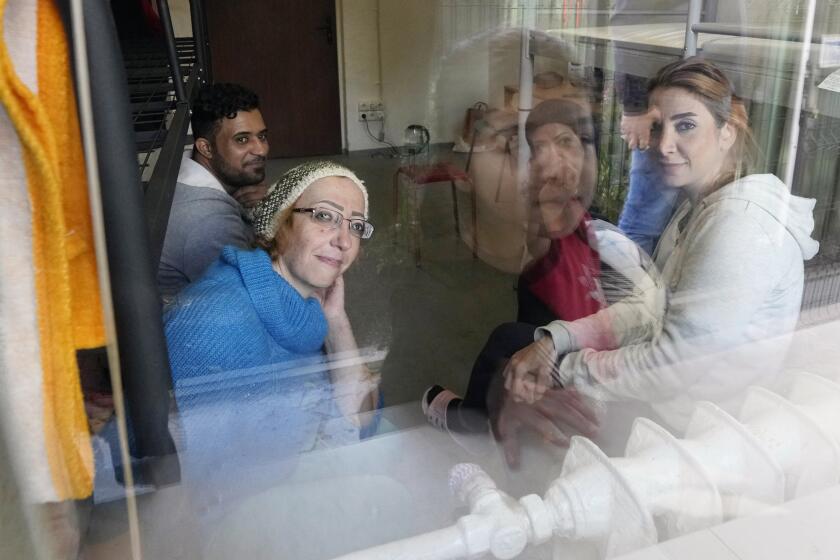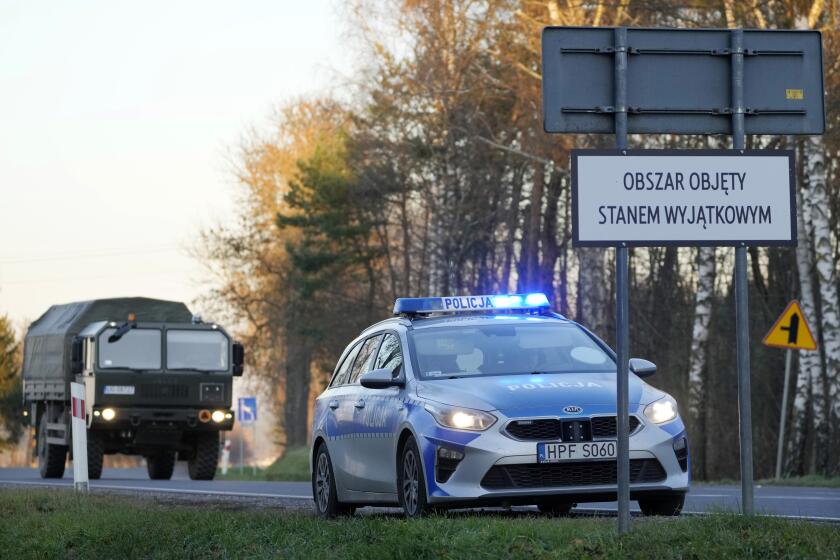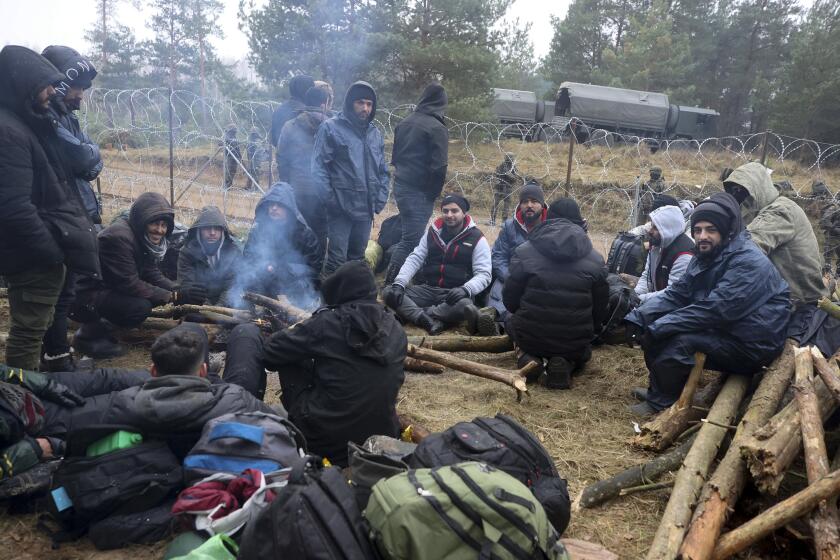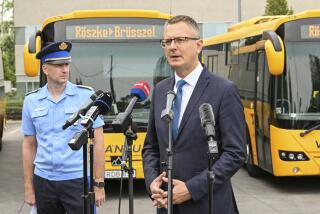EU moves to impose more sanctions on Belarus over migrant crisis
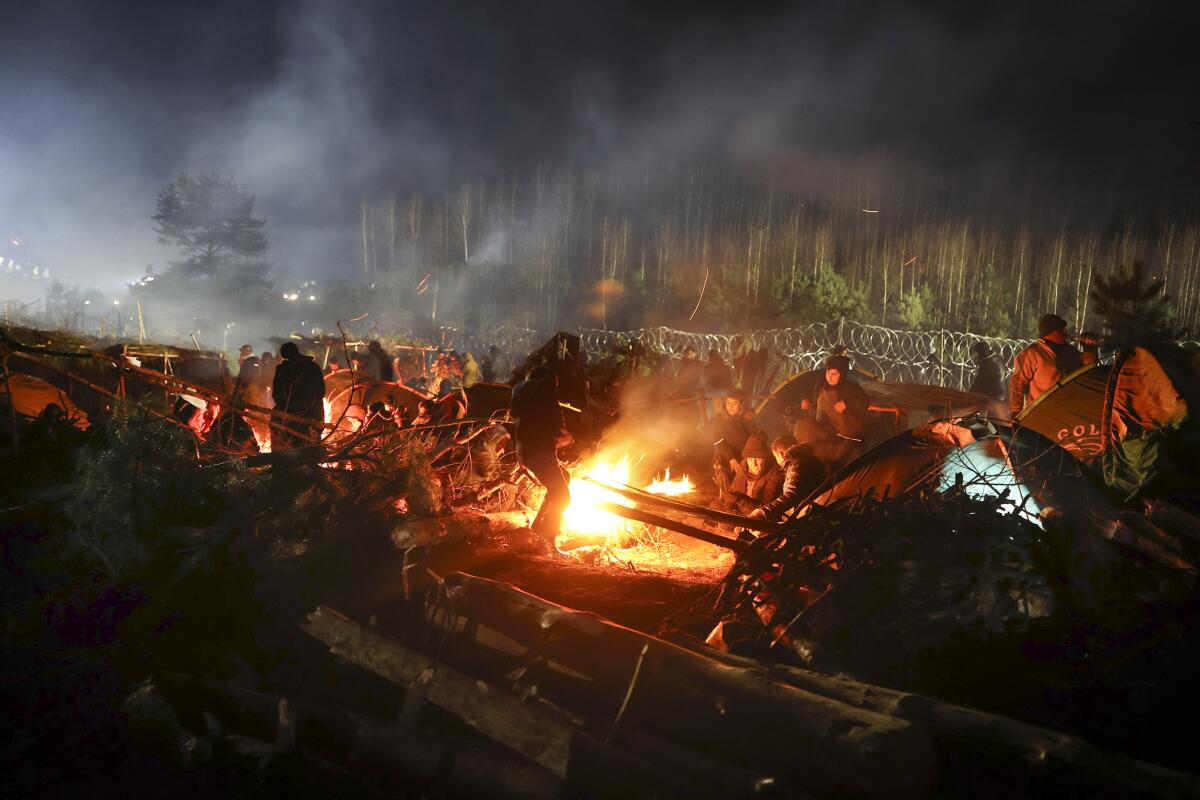
- Share via
BRUSSELS — The European Union on Monday ratcheted up pressure on Belarus by agreeing to slap new sanctions on President Alexander Lukashenko’s regime and others accused of helping him wage a “hybrid attack” against the bloc using migrants.
Up to 4,000 migrants are stuck in makeshift camps in freezing weather after Poland reinforced its border with Belarus with 15,000 soldiers, in addition to border guards and police. At least nine migrants have died. Many of them want to head farther west, often to Germany.
The 27-country EU has already imposed four sets of sanctions on Belarusian authorities and senior officials over the disputed election in August last year that returned Lukashenko to office and the security crackdown on peaceful protesters that followed.
The EU is preparing a fifth lot, and on Monday the bloc’s foreign ministers extended the scope of those measures to add airlines, travel agents and others accused of helping to bring migrants to Minsk, the Belarusian capital.
“Today’s decision reflects the determination by the European Union to stand up to the instrumentalization of migrants for political purposes. We are pushing back on this inhuman and illegal practice,” EU foreign policy chief Josep Borrell said in a statement.
EU headquarters said the bloc will now be able to target individuals and entities organizing or contributing to activities by the Lukashenko regime that facilitate illegal crossing of the EU’s external borders. A list of those to be hit by the asset freezes and travel bans is expected to be finalized in coming days.
People hoping to reach Europe from war-torn lands are finding themselves pawns in an escalating dispute between Belarus and the European Union.
The EU believes Lukashenko began luring migrants to Belarus in recent months and transporting them to the EU border as part of a retaliatory attack meant to destabilize the bloc. The EU has been deeply divided over how to manage migrants since well over 1 million people entered in 2015.
Also Monday, the United Arab Emirates banned travelers from several Middle Eastern countries from boarding flights to Belarus, cutting off one of the last major air routes for would-be migrants there. Thousands of people from around the Middle East, many of them Iraqis and Syrians, have been trying to cross into the EU this year through a back door opened by non-EU member Belarus.
Lukashenko brushed aside the threat of fresh EU measures.
“We will defend ourselves. That’s it — there’s nowhere to retreat further,” he was quoted as saying by the state news agency Belta.
Hundreds of migrants are massed at the Belarus-Poland border in what the European Union calls a deliberate attempt by Belarus to destabilize the bloc.
Lukashenko also denied that his government had organized the migrant increase at the border, saying that “it isn’t worth the effort,” and he insisted that the migrants were resisting Belarusian efforts to encourage them to return to their home countries.
“These people, I must say, are very stubborn: No one wants to return. And understandably so. They have nowhere to come back to. They have no place to live there — they know there’s nothing to feed their children with. Moreover, some are simply afraid for their lives,” he said.
At the Belarus-Poland border, a spokeswoman for the Polish border guard, Anna Michalska, said Monday that hundreds of migrants have gathered in the northeast by the recently closed crossing at Kuznica.
“We are expecting an attempt at forceful crossing of the border,” Michalska said. She said it was worrisome that the migrants are under the supervision of Belarus forces, and expressed concern about possible attempts to provoke Polish troops.
Fears that the authoritarian leader of Belarus is using migrants as a weapon to destabilize the European Union put new strains on the 27-nation bloc.
Asked about the danger that more sanctions might only make things worse, German Foreign Minister Heiko Maas said: “I don’t have the impression that Belarus behaves constructively without sanctions. That wasn’t the case in the past.”
“We are far from the end of the spiral of sanctions,” Maas added.
Belarusian carrier Belavia is among the airlines likely to be hit, and Maas warned other companies to follow the example of Turkish Airlines by restricting flights to the Belarus capital.
“Those that don’t must expect tough sanctions. The situation is so dramatic that I can no longer rule out the denial of overflight rights or landing permission in the European area,” he said.
Start your day right
Sign up for Essential California for the L.A. Times biggest news, features and recommendations in your inbox six days a week.
You may occasionally receive promotional content from the Los Angeles Times.
Lithuanian Foreign Minister Gabrielius Landsbergis said that “we need to make Minsk airport a no-fly zone.” He said the EU must ensure that planes likely to be bringing in migrants bound for Europe “wouldn’t land in Minsk, or actually any Belarusian airport. It is very crucial to do that.”
The EU says that the authoritarian Belarusian regime has for months invited migrants to Minsk, many of them Iraqis and Syrians, with the promise of help to get them across the borders of Poland, Latvia and Lithuania, which form the eastern flank of both the EU and NATO.
In response, the three are beefing up their borders. In an interview Sunday, Polish Prime Minister Mateusz Morawiecki said he and his two Baltic counterparts are discussing whether to call for emergency consultations at the NATO military alliance.
More to Read
Sign up for Essential California
The most important California stories and recommendations in your inbox every morning.
You may occasionally receive promotional content from the Los Angeles Times.
